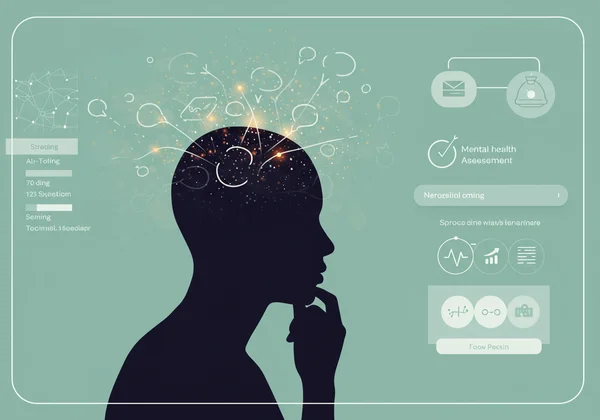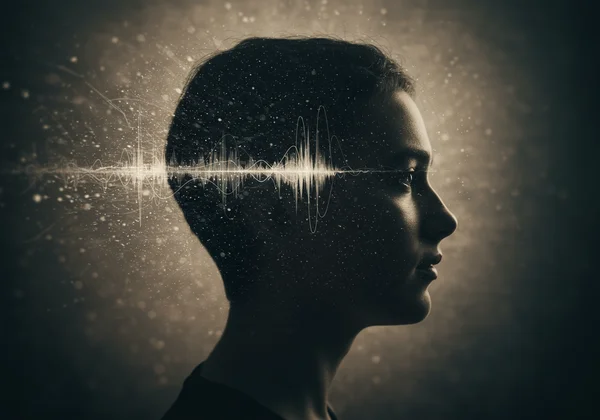精神分裂症测试:了解幻觉与妄想
您或您的亲人是否正经历令人不安的混乱思维或感知?当现实感变得模糊时,这可能是一种孤立且可怕的经历。了解幻觉和妄想等症状,是识别精神分裂症潜在早期迹象的第一步。如果您发现自己问:“ 我是否患有精神分裂症,该如何检测? ”,请知悉,寻求清晰的答案是一种力量的体现。本指南将解释常见的幻觉和妄想体验,阐明它们的含义、表现方式以及为何识别它们对于寻求支持至关重要。
应对这些担忧可能会让人感到不知所措,但您不必独自面对。获取知识是从困惑走向理解的有力途径。为了获得私密且即时的进一步探索这些症状的方式,请考虑进行一次保密的 精神分裂症测试 。像我们 免费在线评估 这样的初步工具,可以为您提供关于您经历的宝贵初步见解。

认识精神分裂症中的幻觉
与精神分裂症相关最广为人知的症状之一是幻觉。幻觉是在没有外部刺激的情况下产生的感知。简单来说,这意味着看到、听到、感觉到、闻到甚至尝到实际上并不存在的东西。这些体验并非虚构;对经历者而言,它们感觉完全真实,并且可能非常生动。
最常见的类型是幻听,即个体听到声音或其它声响。这些声音可能是评判性的、命令性的,或是中性的,并可能引起严重的痛苦。无论您是亲身经历还是正在支持他人,同理心对于理解这一点至关重要。这不是一种选择或软弱的标志,而是一种复杂的神经学事件,需要富有同情心的支持。
幻觉是什么感觉?
描述幻觉的体验可能很困难。想象一下,在一个空房间里听到清晰的谈话声,或者看到一个别人都看不到的身影。这些都不是白日梦或转瞬即逝的想法;它们是强大的 感官体验 ,会吸引人的注意力。对于经历者而言,辩驳说这种体验“不是真的”可能会让人感到被否定和困惑。
其情感影响差异很大。有些幻觉可能令人欣慰,但许多幻觉会令人恐惧、产生干扰,并加剧偏执和恐惧感。这种主观体验是早期识别至关重要的核心原因。识别这些感知为潜在症状,是有效管理它们并减轻其影响力的关键第一步。
探索不同类型的幻觉
虽然幻听是最常见的,但幻觉可能涉及五种感官中的任何一种。了解不同类型有助于更全面地描绘一个人可能经历的情况。提高认识可以更好地与医疗专业人员沟通。
-
幻听:听到并不存在的声音或声响。这是精神分裂症中最常见的类型。
-
幻视:看到不存在的人、物、光线或图案。
-
幻触:在皮肤上感觉到异常感觉,例如虫子爬行,或者在无人触碰时感觉自己被触摸。
-
幻嗅:闻到他人闻不到的气味,通常是不愉快的。
-
幻味:在口中没有食物的情况下,体验到味道,通常是奇怪或令人不快的。

解读妄想:精神分裂症的核心症状
除了幻觉,妄想也是精神病的另一个标志性症状,并且常常出现在精神分裂症中。这些与仅仅持有不寻常的信念不同;它们是坚定的、 固定的信念 ,即使有强有力的相反证据也依然存在。患有妄想症的人无法被“说服”改变他们的想法,因为对他们来说,这个信念是不可否认的真相。
妄想通常有特定的主题,可以解释患者所经历的混乱经历。例如,被监视的信念(偏执妄想)可能是大脑试图理解令人不安的感觉或幻听的一种方式。理解潜在思维过程的关键在于识别出这些是妄想。
什么是妄想?定义错误的信念
妄想是基于对现实的错误解读而产生的虚假信念。它不是意见或文化问题,而是思维过程紊乱的症状。例如,相信自己拥有他人不具备的特殊能力,与仅仅拥有高度的自尊不同。关键因素是尽管有清晰、矛盾的证据,但信念依然坚定不移。
这些信念会严重影响一个人的行为和人际关系。经历 偏执想法 的人可能会变得社交退缩,不信任亲人,这并非出于恶意,而是出于他们真实地相信自己处于危险之中。在支持有妄想症的人时,同情心和非对抗性方法至关重要。
精神分裂症中常见的妄想类型
妄想可以以多种方式表现出来,识别其类型有助于理解患者特定的恐惧和世界观。提供一个安全的空间来探索这些担忧,或许可以从 保密自我评估 开始,这可以是一个温和的第一步。
-
被害妄想:认为自己或亲人受到虐待、监视或被密谋陷害。这是最常见的类型。
-
夸大妄想:认为自己拥有非凡的能力、财富、名望或权力。
-
关系妄想:认为中性事件或他人的评论是专门针对自己的。
-
躯体妄想:认为自己有某种疾病或身体缺陷。

识别幻觉和妄想之外的早期精神病迹象
虽然幻觉和妄想是显著的症状,但精神分裂症的发作通常 preceded by more subtle changes。这些 早期精神病迹象 有时被称为“前驱症状”期。注意到这些变化至关重要,因为早期干预可以显著改善长期预后。无论是担忧的个体还是关心的支持者,都应该了解这些指标。
这些早期迹象通常涉及思维、情感和行为的改变,这些改变偏离了患者的正常状态。这些迹象可能被忽视,尤其是在年轻人身上,被视为“一个阶段”,但如果持续存在或恶化,则需要引起关注。 青少年精神分裂症测试 可以成为父母或监护人寻求初步见解的有用工具。
需要注意的细微变化和其他行为改变
在出现更明显的症状之前,您可能会观察到功能逐渐减退。这些 阴性症状 与幻觉或妄想同样重要,但通常更难发现。它们表现为正常行为的减少或缺失。
- 社交退缩:对朋友和社交活动失去兴趣。
- 言语紊乱:组织思维困难,导致言语难以理解。
- 缺乏动力(意志减退):难以开始或持续活动,包括工作或学业。
- 情感平淡:面部表情或声音的情感表达减少。
- 认知症状:记忆力、注意力及执行功能方面的问题。
早期识别和支持的重要性
证据确凿: 早期干预 是管理精神分裂症最有效的方法。及时识别早期迹象并寻求帮助,可以减轻疾病的严重程度,减少对生活的影响,并为更好的康复之路提供支持。目标不是引起恐慌,而是赋予您知识的力量。
了解这些症状至关重要;下一步是行动。这不一定意味着立即安排精神科评估。它可以从一个简单、私密的步骤开始,例如使用 免费精神分裂症测试 在线筛查工具来整理您的想法和担忧,然后再与专业人士交谈。

从困惑到清晰:采取下一步行动
阐明幻觉、妄想和其他精神分裂症的早期迹象的含义,可以将不确定性转化为明确的前进道路。如果您或您的亲人感到担忧,寻求信息是一个有力且充满希望的行为。您已经通过阅读本指南开始了这一步。为了获得个性化的见解,请考虑我们主页上的免费、保密自我评估。该评估基于前驱症状问卷,可在几分钟内提供初步见解,作为您心理健康之旅反思的有价值工具,而非诊断。
免责声明:本测试并非诊断工具。它仅用于信息目的,不能替代合格医疗专业人员的咨询。如果您担心自己的心理健康,请咨询医生或心理健康专家。
关于精神分裂症症状的常见问题
精神分裂症的五种迹象是什么?
精神分裂症的五类关键症状是妄想、幻觉、言语紊乱、严重紊乱或紧张性行为,以及阴性症状(如情感表达减弱或缺乏动力)。并非所有人都会出现所有这五种症状。 早期迹象评估 可以帮助您探索是否存在这些模式。
精神分裂症是如何开始的?
精神分裂症通常在青春期晚期或成年早期以“前驱症状”期缓慢开始。早期迹象可能很微妙,包括社交退缩、学业或工作表现下降、睡眠困难以及易怒或多疑感增加,远在出现幻觉等明显症状之前。
我如何知道自己是否患有精神分裂症?
只有合格的医疗专业人员,如精神科医生,才能诊断精神分裂症。自我诊断是不可靠的,并可能引起不必要的焦虑。但是,如果您感到担忧,一个很好的第一步是使用保密的筛查工具来整理您的观察结果。然后您可以与医生讨论结果。如果您对自己的经历感到好奇,可以通过我们的评估 获得初步见解。
哪些测试可以确诊精神分裂症?
没有单一的血液检查或脑部扫描可以确诊精神分裂症。诊断是由精神健康专业人员在进行全面的精神评估后做出的。这包括讨论症状、个人病史,以及排除可能引起类似症状的其他医疗状况或物质使用。初步的 精神分裂症评估测试 可以作为与专业人士进行沟通的有用起点。